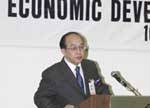China to Continue Pursuing Active Fiscal Policy: Finance MinisterIt will issue 150 billion yuan of government bonds in 2001, for investments in such public good areas as infrastructure, environmental protection, science and education, he told a country presentation program on the sidelines of the 34th annual meeting of the Asian Development Bank's Board of Governors. Summing up last year's performance, Xiang said China's GDP reached 8.94 trillion yuan, exceeding for the first time 1 trillion U.S. dollars, or over seven times that of 1978, the year when China began the policy of reform and opening to the outside world. He said that in 2001, the first year of the 10th five-year plan aiming at a 7 percent annual GDP growth, China had a good beginning. He said that in the first quarter, GDP grew 8.1 percent and foreign trade rose 15.9 percent totaling 113.8 billion U.S. dollars, exceeding the 100 billion dollar mark for the first quarter of a year. In the meantime, he stressed that China is ready to take effective measures to cope with any impact that the global economic slowdown may have on Asian economies. China's development is of positive regional and even global significance, the minister said. After the outbreak of the Asian financial crisis in 1997, China resolutely adhered to the policy of maintaining stable RMB exchange rate and vigorously adopted an expansionary policy that helped maintain rapid growth, thus contributing to the recovery and restoration of the Asian economy. China, he said, has been working hard to reduce poverty and improve its people's life through economic development, and thus contribute to the United Nations' goal of global poverty reduction. He said that in 2005 which is the last year of the 10th five- year plan, foreign direct investment in China is expected to be 40 billion U.S. dollars and total trade volume is projected at 680 billion dollars. Difficulty in Developing Countries' ExportsChina said Thursday that a reduction in U.S. imports implies a shrinking of exports for developing countries and thus the latter should be prepared to respond to any adverse impact that the external economic environment may bring on them."We noted that the U.S. economy posted an unexpected 2 percent growth in the first quarter of 2001, but half of the growth was due to an import reduction, and that implies a contraction of export markets for developing countries," Chinese Finance Minister Xiang Huaicheng told a session of the 34th annual meeting of the board of governors of the Asian Development Bank (ADB), now being held in Honolulu, Hawaii. He described the future of Asian economies as bright, on condition that Asian countries will strive for stability and development, adopt structural adjustments, open up regional markets, strengthen economic cooperation, increase capability to ward off external risks and explore and find appropriate development models. Xiang voiced his hope that the ADB will review as soon as possible its capital adequacy to ensure its financial capacity to satisfy borrowers' poverty reduction needs when two thirds of the world poor live in Asia. In this regard, he urged developed shareholders in the ADB to do their own part in meeting commitment to poverty reduction. "Bestowing ADB the mandate to reduce poverty, the shareholders should have more responsibility to enable ADB to do its job properly," he said. |
| People's Daily Online --- http://english.peopledaily.com.cn/ |
